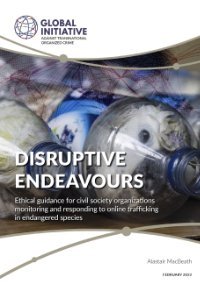Disruptive Endeavors: Ethical guidance for civil society organizations monitoring and responding to online trafficking in endangered species
By Alastair MacBeathbn
The world’s most popular social media platforms, e-commerce sites, and specialist forums consistently host advertisements for the sale of endangered species or products made from their parts. These private platforms bear almost no legal liabilities for hosting such content or facilitating this trade, and as a result, their responses have been weak and inadequate. This also complicates the response from law enforcement. Without a clear legal basis to act and being overwhelmed by and ill-equipped to counter online crime in general, wildlife crime is usually low on police forces’ priority lists. This lack of prioritization ultimately stems from governments who refuse to acknowledge the urgency of tackling threats to biodiversity or to address the challenges posed by weak responses to cybercrime. Faced with almost complete impunity for illegal wildlife traders online, civil society actors, including non-governmental organizations (NGOs), conservation organizations, and citizen investigators are stepping into the gap: monitoring, reporting, running complex – sometimes clandestine – investigations and even engaging in confrontations to disrupt these illegal markets. But unlike law enforcement, journalists and academics, civil society actors have no universally accepted professional ethical standards or regulations to guide their investigative conduct. This community tool is aimed at supporting civil society actors in responding to this critical ethical dilemma: How should they balance ethical imperatives to respond to wildlife crime without contravening user privacy, accepted norms related to mass data collection or a platform’s terms of service? It also intends to provide an overview of the ethical issues involved in civil society organizations’ collection of data, investigation into the illegal online trade in wildlife and possible interventions.
Geneva: Global Initiative Against Transnational Organized Crime, 2022. 36p.


